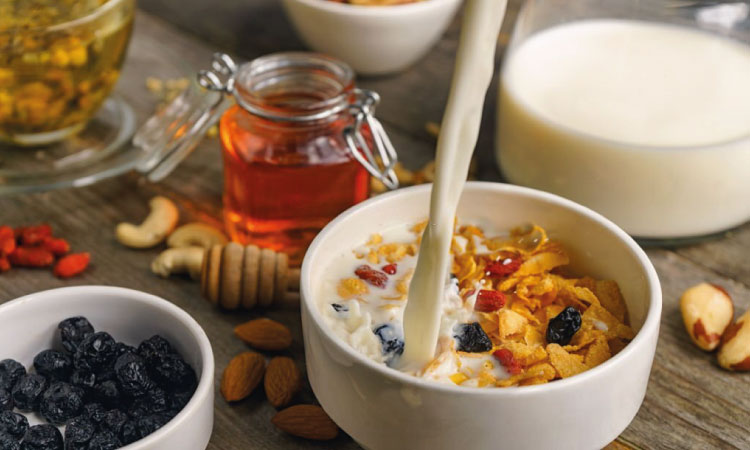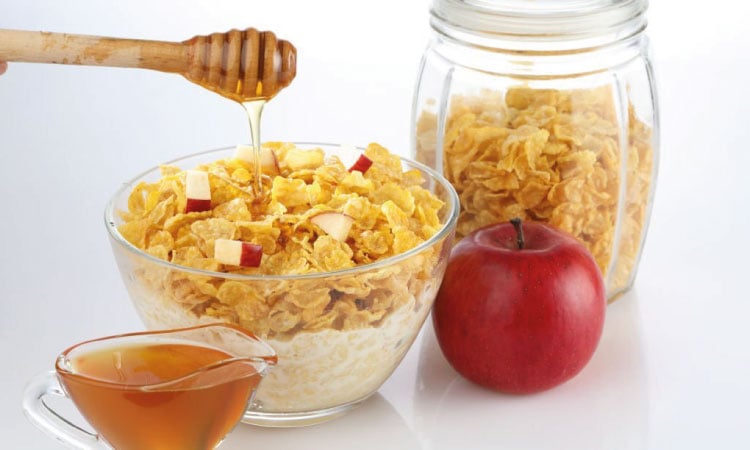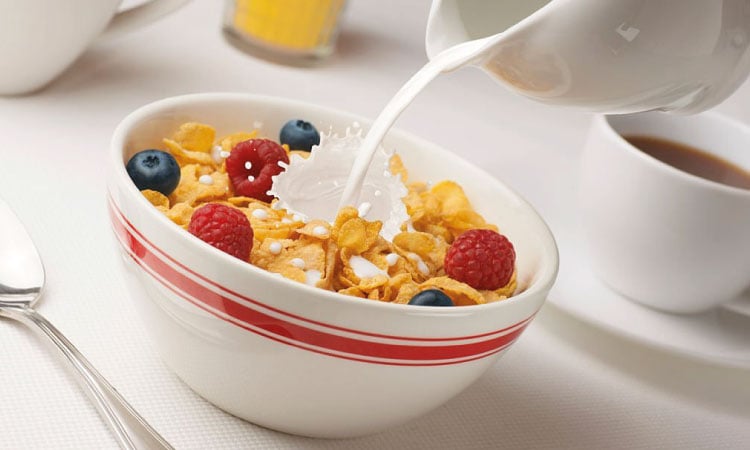When a woman is pregnant, her entire diet is altered to meet the needs of her unborn child. Maintaining a sensible and well-balanced diet is critical while pregnant in order to provide your growing child with adequate nutrition. In addition, pregnancy is a period of a woman’s life during which she experiences a variety of cravings due to the surge of pregnancy hormones. During pregnancy, you may find that some of your cravings are not on the safe and healthy side. This article is for those who are craving cornflakes during pregnancy. Here we will discuss everything about cornflakes during pregnancy.
The Cornflakes: What Exactly Are They?
Toasted cornflakes are a popular type of breakfast cereal that is made by toasting flakes of corn. Despite the fact that they are low in calories, cornflakes are counted as a filling meal. In general, cornflakes are orange-yellow in color, crunchy, and softened with milk. Cereal is typically served with milk in a bowl.
Cornflakes contain a significant number of beneficial nutrients. You can incorporate it into your morning meal by having it with either warm or cold milk. Many people like to add fruits and nuts to enhance their taste and nutritional value.

One of the best things about cornflakes is that they come in many different flavors, such as plain, sugar-frosted, salted, malted, honey, chocolate-flavored, almond-flavored, strawberry, banana, mango, and so on.
Related Reading: 21 Pregnancy Superfoods To Include In Your Pregnancy Diet
What Are Raw Cornflakes?
Raw cornflakes are uncooked, unprocessed cornflakes that are commonly used in the preparation of Indian snacks like Chivda. It is made from milled sweetcorn that has been allowed to ripen in the sun. You can eat raw cornflakes during pregnancy. To make them edible, however, they must first be deep-fried and cooked.
Eating Cornflakes During Pregnancy- Are They Safe?
Yes. Cornflakes are safe for consumption during pregnancy. But instead of flavored and sugar-laden cornflakes, choose plain cornflakes during pregnancy. Pregnant women can safely eat whole grain cornflakes that don’t contain any additives or preservatives. Add dry fruits and nuts or fruits to make it a protein-rich meal if you choose to consume daily cornflakes during pregnancy. It can also be consumed as a midday meal. The only thing to remember is that, as with any other food, moderation is the key when it comes to cornflakes during pregnancy.
Nutritional Profile Of Cornflakes

Cornflakes are fat-free and cholesterol-free. It contains numerous minerals and vitamins. Furthermore, many cornflakes are also fortified with vitamins and minerals, which makes them even more nutritious. As a result, the nutritional content of cornflakes varies from brand to brand.
Calculate Due Date With LMP
The following is a quick rundown of the nutritional facts for cornflakes. There are 89 calories in one cup, or about 25 grams, of cornflakes1. Also,
- It is an excellent source of iron. About 40% of a typical person’s daily iron needs can be met by just 25 grams of cornflakes
- Cornflakes also provide:
- 52% DV Vitamin B12
- 29% DV Vitamin B2 (Riboflavin)
- 28% DV Vitamin B1 (Thiamin)
- 28% DV Vitamin B3 (Niacin)
- 26% DV Vitamin B6
- It is rich in folate
- It contains a considerable amount of protein
- There is a substantial amount of sodium in cornflakes
- Despite not being a particularly abundant source, it still has a sizable amount of fiber. However, by adding fruits and nuts, we can enhance its fiber content
Benefits Of Eating Cornflakes During Pregnancy
Cornflakes contain some essential nutrients. They are therefore beneficial to pregnant women when consumed in limited quantities. Furthermore, one of the benefits of cornflakes with milk during pregnancy is that the expecting mother can reap the goodness of both milk and cornflakes.
Pregnant women can reap the following benefits from eating cornflakes:
1. A wise choice for morning sickness
Pregnant women, especially during the morning, find it difficult to eat foods with strong flavors and aromas. Bland foods, such as cornflakes, are gentle on the stomach, and eating bland foods first thing in the morning may help relieve nausea symptoms.
2. Enhances energy levels
Pregnancy exhausts the expectant mother due to the surge of pregnancy hormones. Morning sickness is prevalent among pregnant women. During the first twelve weeks of their pregnancies, a lot of women report feeling extremely exhausted. Cornflakes are high in carbohydrates, which provide energy and keep the pregnant woman feeling energized throughout the day, thus it becomes a perfect snack to combat morning sickness. In addition, the high thiamine content in cornflakes boosts energy production by speeding up carbohydrate metabolism.
3. Can reap the benefits of fiber
The fiber content of one cup of cornflakes (25 grams) is around 0.82 grams2. Adding fruits, nuts, and dried fruit to a bowl of cornflakes can boost its fiber content even further. Cornflakes, with all the goodness of dietary fiber, can help lower blood pressure and relieve constipation during pregnancy. The consumption of fiber-rich foods during pregnancy also reduces the risk of developing gestational diabetes and preeclampsia3.
4. Can derive fiber’s advantages
25 grams of cornflakes contain 145.75 micrograms of folate, which is approximately 36 percent of the daily value4. Folate is essential for the formation of new cells, making it especially crucial during pregnancy. The risk of major brain and spine birth defects (anencephaly and spina bifida) in a baby can be reduced by ensuring adequate folate intake in the first few months of pregnancy.
5. Beneficial for eyesight
Eyesight and vision can be affected by changes in hormones, metabolism, fluid retention, and blood circulation during pregnancy5. Dry eyes and blurred vision are common complaints among pregnant women. Vitamins A, vitamin B, vitamin B12, niacin, and lutein are all found in cornflakes. These are all essential nutrients that contribute to eye health.
6. An excellent source of protein
Cornflakes are protein-rich. There are approximately 2 grams of protein in one cup of cornflakes6. Protein is essential for repairing tissues, developing immunity, maintaining the structure of red blood cells, and regulating enzymes and hormones. Pregnant women should eat a lot of protein to ensure a healthy pregnancy.
The protein content of cornflakes is significantly increased when they are combined with other ingredients such as cashews, almonds, and walnuts. Similarly, adding milk increases the protein content of cornflakes.
7. Reduces the risk of anemia by increasing hemoglobin levels
Pregnancy increases one’s need for iron. Increased blood volume during pregnancy increases the risk of anemia and related complications. A single cup of cornflakes provides 45 percent of the daily iron requirement7.
Risks Associated With Eating Cornflakes During Pregnancy

The primary component of cornflakes is corn. The other main ingredients are sugar, malt flavoring, and high fructose corn syrup. There are sugar-coated and honey-crusted varieties of cornflakes. The majority of these ingredients have a high Glycemic Index (GI), a measurement of how quickly a specific food causes blood sugar levels to spike. Therefore, eating more than the recommended amount of cornflakes during pregnancy carries some risks and side effects.
The following are some of the risks and side effects associated with eating cornflakes during pregnancy:
- Consuming an excessive amount of cornflakes during pregnancy can result in intestinal gas issues and abdominal pain. This is due to the fact that cornflakes are one of those “high-barn” foods
- When consumed in large quantities, cornflakes have the potential to reduce the body’s capacity to absorb minerals, particularly zinc and iron
- Commercial cornflakes have higher fat, sugar, and sodium content. In excess, these factors can impede the development of a healthy pregnancy
- The cornflake grains are acidic in nature8. Consuming an excessive amount of acidic foods during pregnancy can contribute to issues like acid reflux and heartburn
- Cornflakes, when consumed by pregnant women who already suffer from irritable bowel syndrome, are known to make the condition significantly worse
- Cornflakes have a high glycemic index, which means that eating them in large quantities can cause elevated levels of glucose in the blood9
Related Reading: 11 Home Remedies For Acid Reflux During Pregnancy
Tips To Eat Cornflakes During Pregnancy
During pregnancy, it is essential to exercise caution when selecting cornflakes and storing them in a pantry:
- Pregnant women should always choose the healthiest cereal brand
- When the package is opened, it should be stored in a cool, dry place after tightly sealing it
- If cereal develops an unpleasant odor, taste, or appearance, or if mold develops, the entire product must be discarded
The following are some guidelines for consuming cornflakes while pregnant:
- Mixing cornflakes, rice flakes, and wheat flakes together with milk will give you a multigrain breakfast, which has many health benefits
- Peanut butter, honey, cornflakes, and walnuts combine to create an irresistible, nutty snack that can satisfy hunger pangs at any time. When combined, peanut butter, honey, cornflakes, and walnuts produce an irresistible, nutty snack that can be eaten whenever a hunger pang hits
- To make it more appetizing, you can also incorporate ingredients like blueberries, cranberries, and raisins into the bowl of cornflakes and milk.
- Always add warm milk to your cornflakes, as eating dry cornflakes may cause nausea
- Steer clear of adding sugar to your serving of cornflakes. Add fresh chopped fruit and natural sweeteners such as strawberries or honey to increase its sweetness naturally
- Honey, peanut butter, bananas, strawberries, apples, and other fruits can enhance the flavor of plain cornflakes with milk. Nuts may also be added for their crunchiness and nutritional value
- Cornflakes should not be used as an alternative to a balanced diet
- Cornflakes should only be eaten in the morning, not in place of any other meals, especially lunch or dinner
- During pregnancy, it is best to stay away from cornflakes that have been sweetened or flavored with artificial sweeteners and flavors
- Consider consulting with a nutritionist before making any major changes to your eating habits during pregnancy
Conclusion

Cornflakes are a delicious and nutritious breakfast option that can be prepared quickly, making them convenient. It can be served with either warm or cold milk, depending on the pregnant woman’s preference. If you still have questions or concerns, you should talk to your nutritionist about the cornflakes.
FAQs
A healthy breakfast includes fresh fruits and vegetables followed by homemade paratha, idly, upma, etc. However, incorporating cornflakes of high quality in moderation into a well-balanced daily menu can be considered healthy.
However, cornflakes are too low in protein to be a complete meal. To boost nutrition, pregnant women should eat cornflakes with milk, fruits, and nuts.
You can eat a variety of fortified cereals while pregnant, including wheat flakes and rice flakes. For those who want to cut down on their sugar intake, these are an excellent choice.
